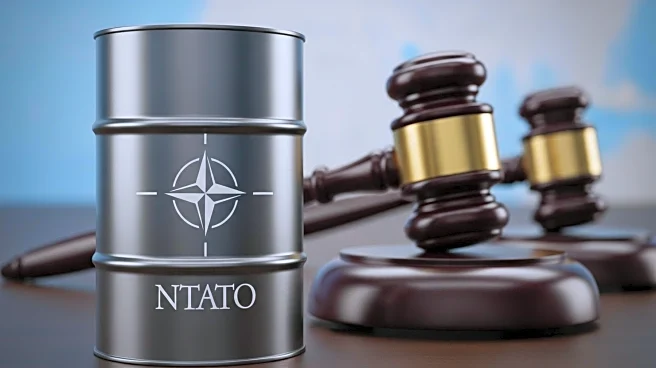What is the story about?
What's Happening?
President Donald Trump announced that he would impose additional U.S. sanctions on Russia only if all NATO countries agree to halt purchases of Russian oil. This proposal, shared on social media, is aimed at increasing pressure on Russian President Vladimir Putin to end the war in Ukraine. However, the plan faces challenges as several NATO members, including Turkey, Hungary, and Slovakia, continue to purchase Russian oil due to economic dependencies. Trump also suggested that NATO should impose significant tariffs on China, citing its strong influence over Russia. This move is part of Trump's broader strategy to counter Russia's aggression in Ukraine, following a recent meeting with Putin in Anchorage.
Why It's Important?
The proposal underscores the complexities of international alliances and economic dependencies. If successful, halting Russian oil purchases could significantly impact Russia's ability to fund its war efforts. However, the plan could face resistance from NATO members with strong economic ties to Russia, potentially leading to diplomatic tensions. The call for tariffs on China also highlights the geopolitical dynamics at play, as China and Russia's alliance could prolong the conflict. The outcome of Trump's proposal could influence global energy markets and international relations, affecting economies and political alliances worldwide.
What's Next?
The proposal's success depends on the willingness of NATO members to align with Trump's strategy. European leaders, who are committed to free trade, may resist the call for tariffs on China. Additionally, the economic impact on countries heavily reliant on Russian oil could lead to internal debates within NATO. Trump's approach may also prompt reactions from Russia and China, potentially affecting their diplomatic and economic strategies. The situation remains fluid, with potential implications for U.S. foreign policy and international economic relations.
Beyond the Headlines
Trump's strategy reflects a shift in U.S. foreign policy, emphasizing economic leverage over military intervention. The proposal raises ethical questions about the balance between economic sanctions and humanitarian concerns, as the war in Ukraine continues to cause civilian suffering. The call for NATO unity also highlights the challenges of maintaining cohesive international alliances in the face of diverse national interests.














